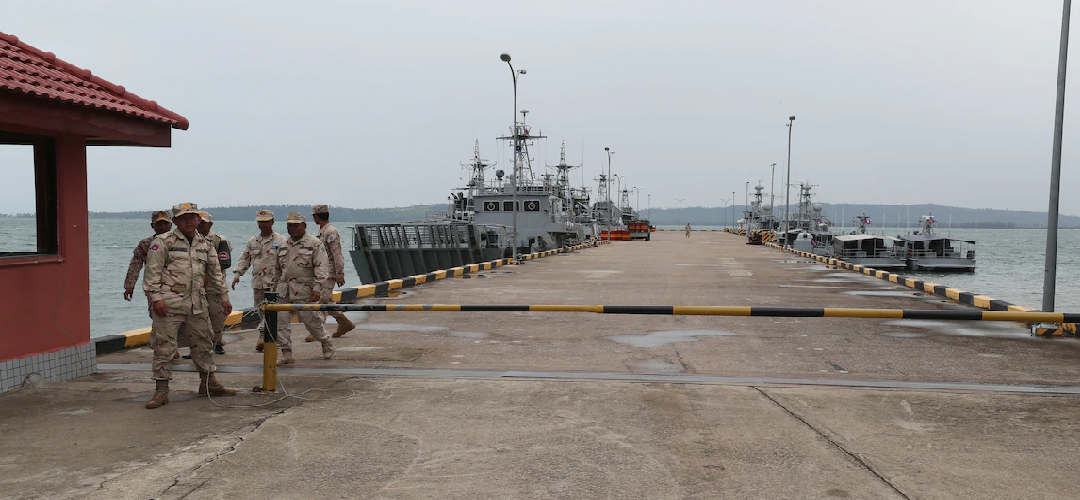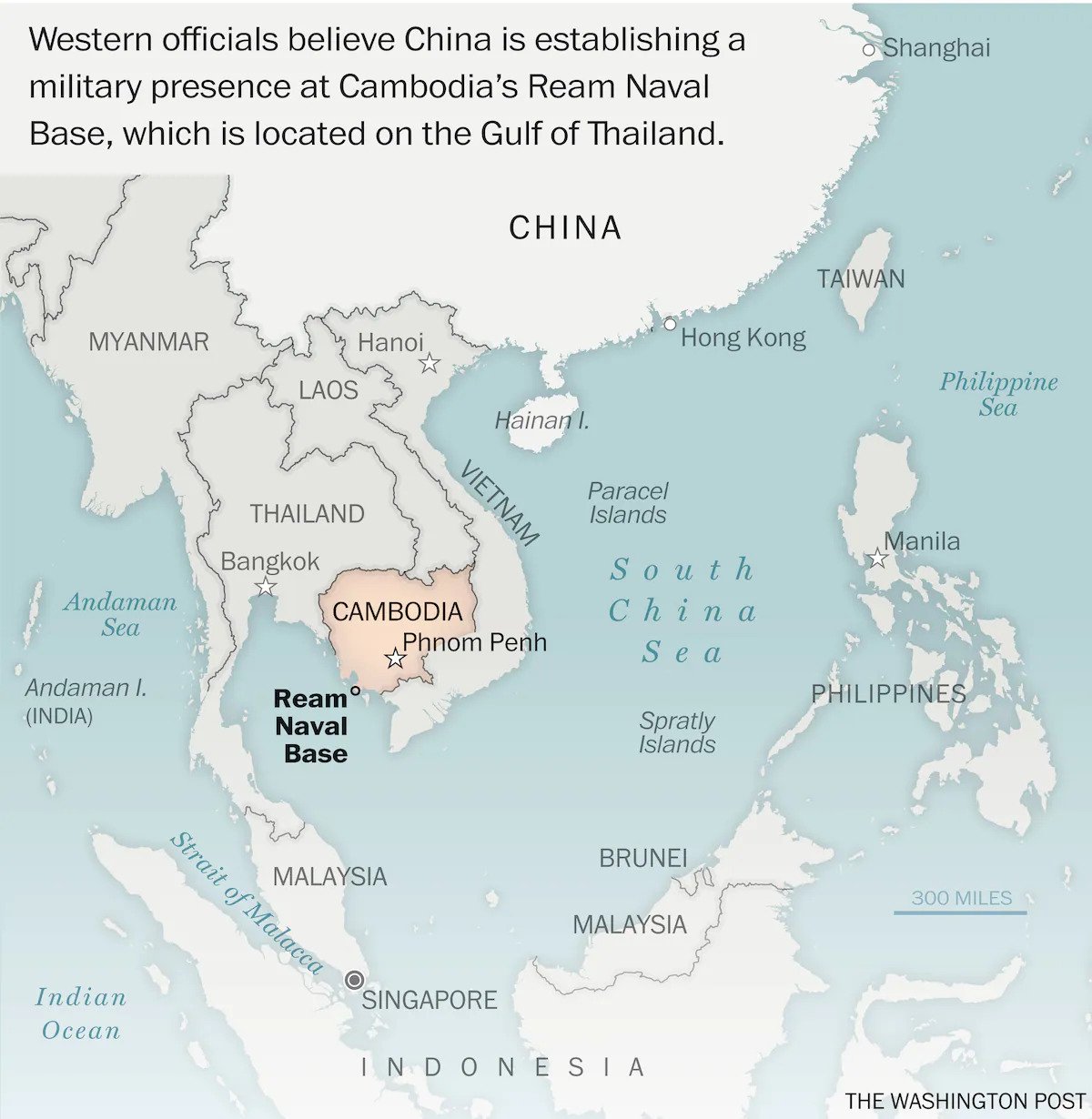Dragon Spreading Its Wings!
August 12, 2023 | Expert Insights

The first reports of China building its second naval base overseas (after Djibouti) started filtering in 2019 when the Wall Street Journal first broke the news about its Ream Naval Base in Cambodia. Both Chinese and Cambodian sources have consistently denied the activities' naval angle, but it is difficult to conceal the intentions from high-power satellites.
Background
Relations between China and Cambodia are historic. Cambodia was one of the many tributary states of the Chinese Empire. These states were not formally part of the empire. They just had to pay annual tributes to maintain their loyalty and fealty.
This patron-client relationship continued into the modern era. When the Chinese Communist Party took power, this gave confidence to other Communist parties in China’s neighbouring countries. One of these was Cambodia. Here the Communist Khmer Rouge movement modelled itself on a far more extreme interpretation of Maoism.
When a Vietnamese invasion overthrew the brutal Khmer Rouge regime, relations between China and Cambodia soured. Following the end of the Cold War, ties slowly started to improve. The current Premier of Cambodia, Hun Sen, was originally a protégé of the Vietnamese. But over the years, he has become highly authoritarian, and as he gets old, he is trying to hand over the reins to his son, making it easier for Beijing to make inroads.

Analysis
This naval base did not suddenly spring out of nowhere. It is a culmination of a planning process that has been long in the making.
For long, there has been blanket denial from the Chinese side about even the existence of any such base. Early this year, the Defence Geospatial Intelligence (DGI) in London was presented irrefutable imagery proof by BlackSky, a U.S.-based private company that claims to provide persistent global monitoring services combining state-of-the-art AI, cloud computing and multi-sensor data fusion. The construction scale going on is difficult to deny or obfuscate.
Just like the Soviets failed to conceal the missile in Cuba in 1962, modern satellite technology has brought into the open the extent of the Chinese military presence at Ream. Beijing and Phnom Penh claim that the base's redevelopment is just an altruistic effort from the Chinese side to modernize the Cambodian Navy. It is claimed that this is just one of many projects China is involved in in Cambodia, and so too much should not be read into this. Harmless activities like dredging the harbour and repairing ageing warships and drydocks are being highlighted to prove their innocence.
The Ream Naval Base is strategically located from a Chinese maritime perspective. Its location on the Gulf of Thailand enables a stronger presence of PLAN in the region and would be valuable in any naval faceoff in the South China Seas, where China has already constructed a string of artificial islands with fortifications.
Far more important is the advantage it gives to China so close to the Malacca Strait, which figures prominently in the naval plans of all of China's potential adversaries to choke China's lifeline of oil and exports once hostilities commence.
With Chinese naval forces permanently located in Ream, it gives them logistical flexibility in terms of ammunition and other replenishments, including medical facilities, thus greatly adding to their operational flexibility and reach to secure its sea lanes of communication through the Malacca Straits.
Another important aspect is the spreading influence of China on its neighbours. Building a military base on foreign soil requires a lot of trust and an alignment of interests. Otherwise, this is a sunken and potentially disastrous investment.
Once the U.S. had a presence in this base, joint US-Cambodian naval training exercises took place here. But the Americans failed to build up on this momentum and thus lost the overall initiative to China. Washington ignored the Hun Sen regime, who was turning into a dictator. However, for Beijing, this makes working with one central authority that much more convenient. The Hun Sen regime, suffering from the impact of the pandemic and war in Ukraine, is starved of investments and looks up to China to restore its fortunes.
Cambodia’s neighbours are not too happy with this new Chinese presence in their vicinity. Today Vietnam and China have serious disputes in the South China Sea. Vietnam has rebuilt its relationship with the United States to counter the Chinese threat. Still, it is not a member of any multi-lateral security alliance. The QUAD is noted by its absence in the South China Sea. This is because none of the countries in this area wants to provoke China by becoming a part of such a security compact. The main QUAD countries also do not want to directly interfere in what many still consider a regional dispute in the South China Sea.
India View
Does India need to be concerned about this new Chinese base in Cambodia? On the face of it, this might not appear to be the case. The region in question is far away from India's immediate neighbourhood, and so does not directly affect New Delhi's security. If we take a deeper dive, we will see that things are not so simple. India has strong bilateral security ties with many countries in this area, like Vietnam, with whom China has antagonistic relations. Apart from this, through the Malacca Straits connection, the South China Sea is important for India.
Assessment
- A policy response to this naval base should have been formulated long ago by Washington and the collective West. Today, after the fact, they have been caught napping. This development shows the U.S. pivot towards the Indo-Pacific has not achieved its objectives. The pivot has not deterred the PRC from going ahead in its hegemonic goals.
- Freedom of movement in international waters is closely linked to the rules-based world order. As a result, much more is at stake here than a simple naval base or a regional dispute.
- This strategic gamble by Beijing could yet fail. The Cambodian autocracy will collapse one day. Any new regime that would come might not look favourably towards China.








Comments